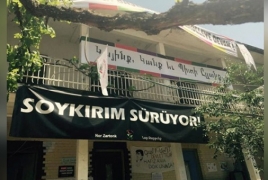Turkey to pay reparations for minorities’ seized properties November 21, 2015 - 16:35 AMT PanARMENIAN.Net - Turkey's efforts to restore the oft-neglected rights of minorities may take a landmark turn as the government prepares to pave the way for the payment of compensation over seized properties, Daily Sabah reports. Properties once owned by religious foundations of Armenian, Greek and Jewish communities were seized as part of discriminating state policies. The properties, ranging from historical buildings and churches to schools were mostly sold to third parties by the Treasury after their confiscation in 1936, following the Armenian Genocide. Turkey’s government is expected to impose compensation regulations within six months, enabling minorities to get paid for properties seized between 1936 and 1974. Turkey had enacted a controversial regulation in 1936 that banned the donation of real estate to churches and temples of non-Muslim communities, paving the way for the seizure of properties from those communities. In 1974, a ruling by the Supreme Court of Appeals had enabled the state to seize the properties minorities acquired after 1936. Properties were mostly returned to its original owner and in the absence of owners, they were taken by the Treasury and changed hands between individuals. Minorities will thus be granted compensation for any property acquired after 1936. Changes are significant especially for the Armenian community, which fought for a return of a historic orphanage and a school in Istanbul. The deed to Camp Armen, an orphanage in Istanbul's Tuzla district, was returned to an Armenian church foundation last month after continued protests against the current owner over the demolition of the site. The Gedikpaşa Armenian Protestant Church Foundation, the first owner of the orphanage, received the deed for the site where more than 1,500 Armenians spent their childhood before a court decision canceled the deed of the foundation in 1979. Another reform for minorities is allowing elections at minority foundations, an idea that was scrapped two years ago following internal disputes in many foundations, which were more or less chaired by the same board members for decades. Non-Muslim minorities in Turkey were long treated as second-class citizens in the 20th century. The controversial wealth tax imposed in 1942, targeting rich non-Muslims, a pogrom in 1955 and the deportation of non-Muslim Turkish citizens in 1964 added to "a fear of the state" among non-Muslim minorities. Authorities said a total of 192 Azerbaijani troops were killed and 511 were wounded during Azerbaijan’s offensive. In 2023, the Azerbaijani government will increase the country’s defense budget by more than 1.1 billion manats ($650 million). The bill, published on Monday, is designed to "eliminate the shortcomings of an unreasonably broad interpretation of the key concept of "compatriot". The earthquake caused a temporary blackout, damaged many buildings and closed a number of rural roads. Partner news |